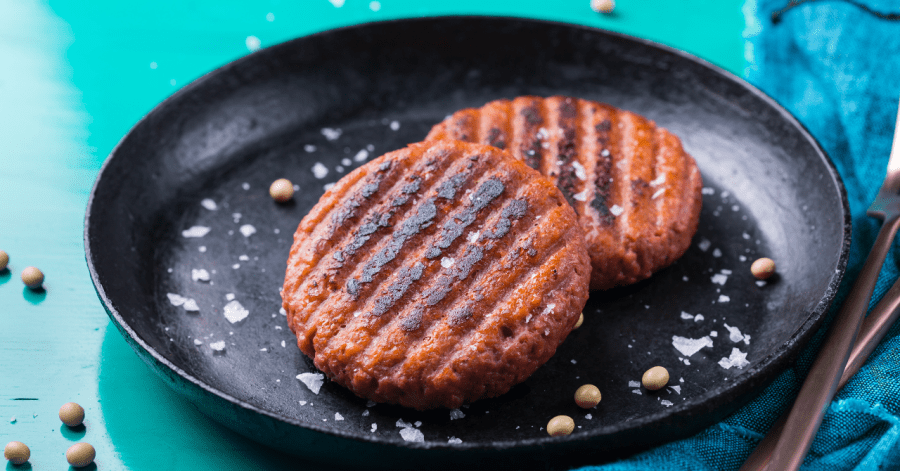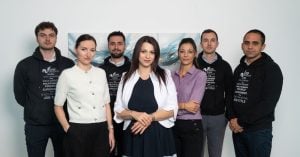Plant-based protein alternatives are not like other food-related consumer habits that come and go as fashion trends. By 2030, the plant-based foods market is expected to account for more than 7.7% of the global protein market, at $166 billion.
A few drivers in the market are pushing up the appetite for vegan and vegetarian products: spending power is shifting to more eco-conscious Millennials and Gen Zs, and greater availability across retailers is increasing awareness and convenience.
What’s more, years of R&D have brought improvements in product diversity, taste, and useability. From burgers with a rich taste and meat-like texture to powder mixes that can imitate eggs when cooked, innovations are fueling adoption of plant-based alternatives.
The Recursive had a closer look at innovative plant-based protein alternatives emerging from Central and Eastern Europe, noting down several success stories from Romania, to Bulgaria, Poland, Slovakia, and the Czech Republic.
Companies from CEE making plant-based protein alternatives
#1 Name: Verdino Green Foods, based in Romania
Founders: Paul Ciurtin, Eberhart Raducanu
Products: Their product range includes plant-based meat alternatives to burgers, cold cuts, mince, and hot dogs, yet they are also known for specialities such as coconut oil cheese.
Market stage: Verdino was launched from Romania in 2019, and quickly expanded its presence in Central and Eastern Europe. In November 2021, they received a growth equity investment from BlackPeak Capital Southeast Europe Growth Equity Fund.
#2 Name: Bluana Foods, based in Romania
Founders: Florin Irimescu
Products: They aim to produce plant-based salmon and tuna sashimi. The founder has extensive experience in the food area, as the owner of fish dishes producer. Seeing the current challenges in the fish industry posed by climate change and overfishing practices, Florin turned his attention to plant-based fish alternatives.
Market stage: The Romanian company recently won the Startup Investor Accelerator in Barcelona, receiving $125K funding.
#3 Name: Cultured Foods, based in Poland
Founders: Brian McWhorter
Products: They create plant-based, convenient, gluten free alternatives to meat, but also eggs. The twist is that products are sold as mixes that need to be cooked with water. The meat mixes contain ingredients like soy protein, chickpea flour, and chia seeds, mixed with their proprietary LactoSpore® cultures. The vegetarian omelet powder mix contains ingredients such as pea and chickpea flour, plant fibers, yeast extract, and natural thickening agents, like guar gum. Veggs can be used for everything from baked goods to stuffings, dumplings, and casserole dishes.
Market stage: Founded in 2019, the products are currently distributed across 14 European countries, including Poland, Greece, and Romania.
#4 Name: Mana, based in Czech Republic
Founders: Jakub Krejcik, Marek Humpl, Grigory Vyatkin, Zuzana Krejcikova
Products: Mana creates products made solely from plants, and loaded with protein, complex dietary fibers, and goods fat. They make powder-based meal replacements, but also burgers containing five different sources of protein (peas, algae, mung beans, hemp, rice), 5 sources of fiber (cellulose, peas, rice, hemp, mung beans), and fats from algae, coconut, and flaxseed.
Market stage: Jakub, the co-founder and CEO of Heaven Labs, created Mana in his own kitchen in February of 2014. Initially just a hobby, it then grew into a startup and they bootstrapped their way to a global brand, entering the US market.
#5 Name: Smart Organic, based in Bulgaria
CEO: Yani Dragov
Products: The biggest producer and distributor of certified organic products in Bulgaria also has a line of protein bars based on fruits and nuts. They produce more than 1 million energy and protein bars every month.
Market stage: Smart Organics was founded in 2009, and is now a leading producer and distributor of organic food in Europe, covering more than 60 countries worldwide. The uptake of organic food in the FMCG sector is fuelling the company’s growth (30% growth in sales and 2021). The company has been present on the BEAM market of the Bulgarian Stock Exchange since 2021. They are now building a new production and storage facility for organic foods in Bozhurishte, with an investment of 2.5 million euros.
#6 Name: Soul Meats, based in Bulgaria
Founders: Yonko Dyakov
Products: They produce plant-based burgers, meatballs, sausages and beef, using ingredients such as peas, mung beans, and brown rice as protein, coconut and sunflower butter as fats, and extracts from beetroot juice and apple for flavoring and coloring.
Market stage: Soul Meats started producing their plant-based foods and commercializing them in 2021, after several years of developing the recipes.
#7 Name: Lunter, based in Slovakia
Founder: Ján Lunter
Executive Director: Juraj Lunter
Products: Lunter’s first and flagship product was tofu, for which they drew inspiration from Japan. Their tofu selection is vast and includes tofu-based sausages, meatballs, and bolognese sauce. They also make plant-based spreads.
Market stage: Lunter started off in 1991 as a small family run business making products in the home basement, in Banská Bystrica in Slovakia. Today, the company employs two hundred people.








